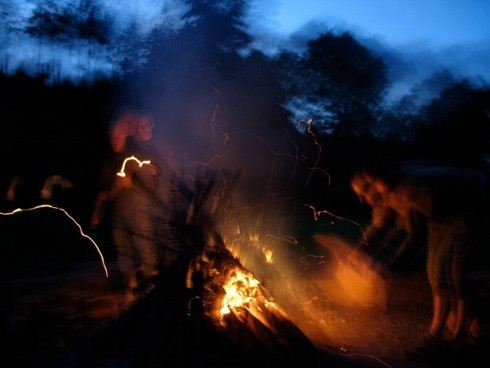lighting fires - Imbolc and Candlemas
Time to light a candle, time to light a fire.
‘Imbolc’ (pronounced ‘im-olk’) means ‘in the belly’ and as a Celtic early spring festival it celebrated the possibility of new life being formed in the earth, still unseen. Rituals would accompany this key turning point in the year, seeking food and shelter for the tough months ahead until the late summer harvest. One of those rituals was the lighting of fires - symbolizing warmth for the rest of winter, and signaling the coming light of spring.

The Christian Church took this and merged it into its own celebration of other events full of promise. Now known as Candlemas, on this date the Church celebrates the Purification of Mary following the birth of Jesus, and the Presentation of her child into God’s care and service in the temple in Jerusalem. In a powerful scene described in the Gospel of Luke, two wise (and probably elderly) mystics called Simeon and Anna recognize in the holy child the coming of something extraordinary. Anna speaks of the child as bringing hope to the Holy City. Simeon holds Jesus in his arms and, sensing a wider significance, declares that this child is ‘a light for the whole world’.
In Christian practice these early spring moments of light and hope are now marked by the making and lighting of candles. And so the streams flow together. The lighting of fires in the Pagan tradition, the lighting of candles in the Christ-following tradition.
There’s something mysterious about fire. Whether in candle, wood-stove or bonfire, fire calls for our attention. Potentially dangerous but also life-enabling. Fragile at times, unstoppable at others. All of human existence held in the flicker of flame. Perhaps that’s why we can find a fire so entrancing.
Whatever we face at this time, however deep our own winters may seem, the rituals of Imbolc and Candlemas remind us that there is still hope, and coming light.
Time to light a candle, time to light a fire.
text and photos by Ian Adams
January 2012
Please bookmark this post at Facebook or Twitter:


Your comments:

Pleasley Forest Church
Encountering the Eternal One within the ancient boundaries of Sherwood Forest More ...

Essex Forest Church
We seek to find the presence of God in the open air and in nature, and to connect with the Divine Being who is present in creation. We seek to foster a love of creation, a love which will lead us to care for it. We look for reconciliation between nature and human beings, and within human relationships. More ...
oxforddiocese:
Great to see how @RiponCuddesdon are engaging with @ARochaUK Eco Church scheme - love the Forest Church area made b… twitter.com/i/web/status/1…
18 Aug 22
YBS_Church:
Our Forest Church takes place on Sunday, 28th August, at 4.30pm in the Gifford Community Woodland (Fawn Wood), for… twitter.com/i/web/status/1…
19 Aug 22
rebeccaBug:
Tremeirchion have their first Forest Church service tomorrow so the boys thought they had better check out that the… twitter.com/i/web/status/1…
20 Aug 22
